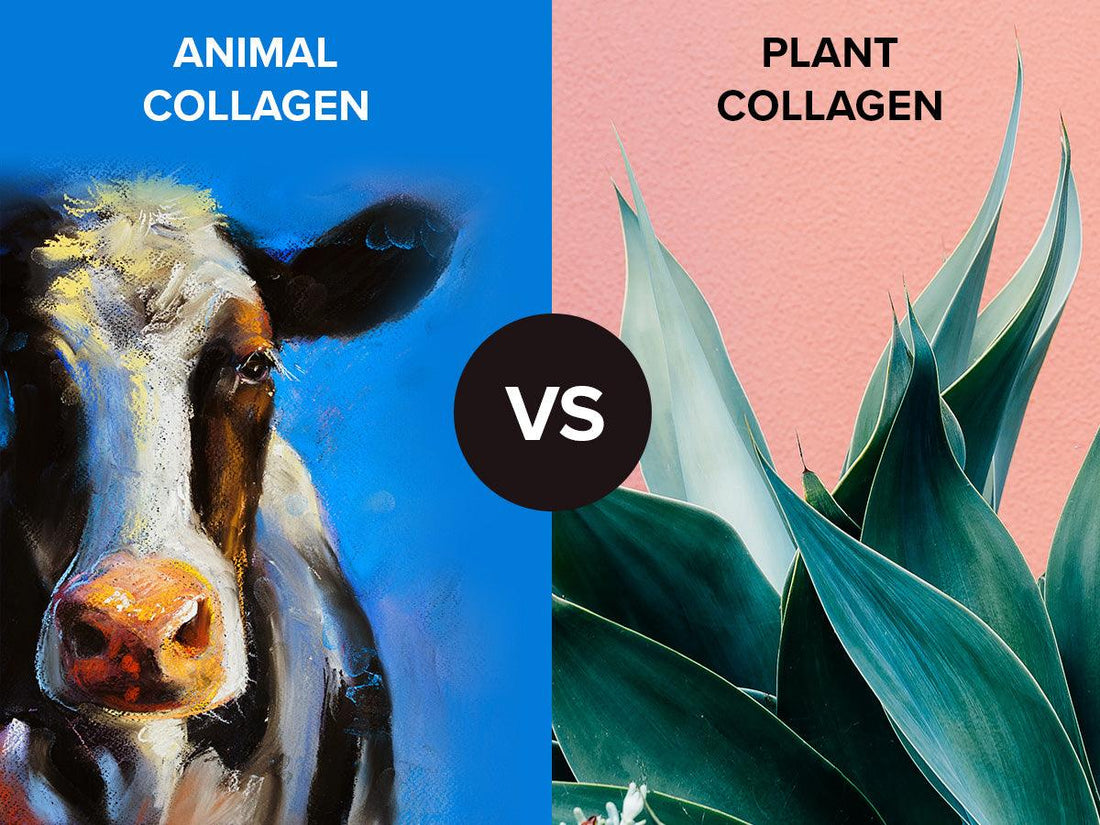
Plant Collagen VS Animal Collagen
In 2019, the trend of using collagen products exploded almost overnight. Fast forward to 2022 and collagen supplements seem to dominate our social media. It appears that everyone is hopping on the “look forever young” bandwagon, purchasing their wrinkle-diminishing face serums and body creams. But what is collagen and what are the benefits?
Collagen is the most abundant protein in the body. It makes up about 30% - 40% of all proteins found, it is the central structural component of our connective tissues that hold our cells together. Your body has been making collagen your whole life, by combining amino acids that you receive from eating protein-rich food such as beef, fish, chicken, pork, eggs, and dairy products. However, the intrinsic aging that takes place over the years eventually begins to slow down the production of collagen. After the age of 20, the dermis layer of the skin produces 1% less collagen each year, causing the skin to lose its elasticity, resulting in wrinkling and sagging. Unfortunately, we can't stop the intrinsic aging process, but we can take steps to replenish the collagen in the form of animal-sourced collagen supplements and vegan sourced supplements.
Collagen throughout History
Animal collagen has been the number one source of collagen for generations. It has been used for centuries by Chinese women as a fountain of youth, as they regularly consumed the feet of pigs and chickens in the hope of curing withered skin and painful joints. However, there have been recent reports that animal-based collagens may contain toxins and heavy metals, such as mercury, arsenic, and lead. Many collagen supplements source their animals from factory farms. These animals may be exposed to heavy metals and toxins either through their diet, water source, or contaminated soil. In addition to the health concerns, there are also moral concerns about using animal-sourced collagen products. How can folks that follow a vegan lifestyle and dietary plan enjoy the benefits of younger-looking skin if the majority of collagen supplements come from animal sources? The answer could lie in plant-based collagen
Is Animal Collagen Better?
Contrary to popular belief, plants do not have naturally occurring collagen like animals do, however they do produce other proteins that are able to mirror the effects of collagen. Plant-based collagen supplements build on the most commonly found amino acids found in animal collagen. They also contain minerals, silica, and antioxidants like vitamin C. They are referred to as collagen promoters because although they don't give the body a direct source of collagen, they stimulate the body to produce its own. Top dermatologist Dr. Dendy Engelman believes that vegan collagen is not as efficient as animal-derived collagen because the body needs to go through a process of breaking down the ingredients to create its own collagen. But these plant-based supplements can be helpful in other ways. Minerals, vitamin c, and amino acids are critical for overall health, therefore the vegan promoters found in the supplements can provide a greater benefit than animal-derived collagen products. For example, vitamin C strengthens the skin barrier by blocking environmental damage. Vegan collagen promoters also strengthen joints, muscles, and bones, reduce levels of anxiety, support the healing of wounds, increase energy, improve allergy symptoms, support the immune systems as well as slow down the process of aging.
Plant Cells for Skincare?
In addition to plant collagen promoters, plant stem cells have shown phenomenal anti-aging properties, causing a whirl of excitement in the beauty industry (MDPI) Stem cells are responsible for the repair and the growth of damaged tissues.
“When plant stem cells are added to a skin care cream or serum, usually they are first broken open, and then they release high concentrations of antioxidants and growth factors”
says Dr Ava Shamban, a dermatologist and specialist in wrinkle reduction. The stem cells stimulate fibroblasts to synthesize collagen, which in turn stimulates skin generation. Extracts from apple fruit and argan stimulate the proliferation and survival of human stem cells and protect them from the adverse effects of UV radiation, contributing to the protection and regeneration of the skin. Lilac stem extract that contains verbascoside helps with wound healing and has strong anti-inflammatory properties and repairs DNA oxidative damage. The good news is that extracts derived from plant stem cells that are used in cosmetics are safe for the human body because they do not produce a response of the immune system. They are also extracted using environmentally friendly methods with little disturbance to their habitat-which is great news for us plant lovers.
Conclusion - Which is better?
So, how do we attain the “forever 21” look without taking animal-based collagen? The answer is to fill your diet with lots of healthy servings of foods packed with vitamins and minerals, such as vitamin C, zinc, and copper. You can find vitamin C in foods such as citrus fruits, red and green peppers, tomatoes, broccoli, and greens, and the minerals from nuts, whole grains, and beans. Add a supplement for that extra boost and invest in good quality plant stem cell face and body products. Remember it's worth being kind to your skin, you will wear it for the rest of your life.